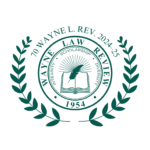Secure Mobility and the Right to Movement
Instead of discussing post 9/11 cases and practice, I am going tospeak about the emerging strategic context in which this law is beingdeveloped, and one area of law being reshaped within that newframework: the law governing the global movement of people and anindividual’s right to movement. This field of law is notablyunderdeveloped, but it has become central to civil liberties and humanrights concerns in the decade since 9/11. Only by understanding the newstrategic environment we are confronting can we see how essential it isto re-focus on this dormant area of law. Read More …
